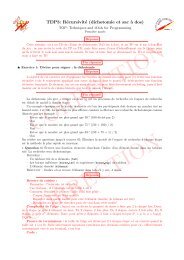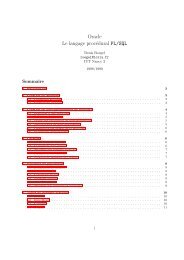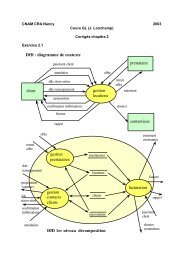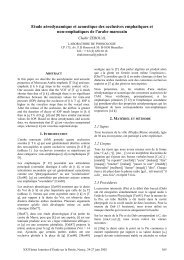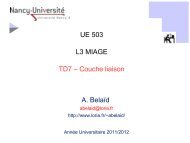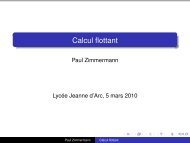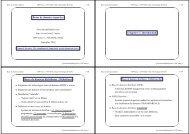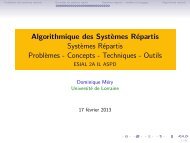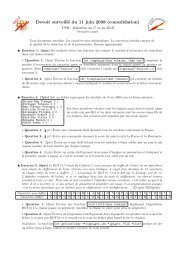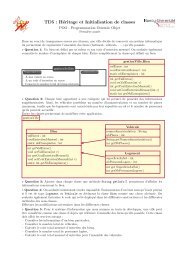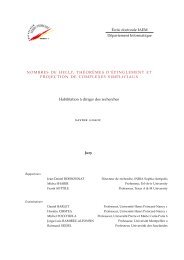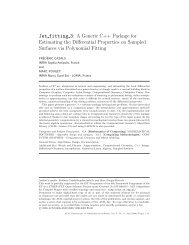- Page 1:
Logical Analysis and Verification o
- Page 5:
Abstract This thesis is developed i
- Page 8 and 9:
viii
- Page 10 and 11:
x CONTENTS 2.1.7 Unification . . .
- Page 12 and 13:
xii CONTENTS 5.8 Decidability of re
- Page 14 and 15:
2 CHAPTER 1. INTRODUCTION Figure 1.
- Page 16 and 17:
4 CHAPTER 1. INTRODUCTION Secrecy T
- Page 18 and 19:
6 CHAPTER 1. INTRODUCTION “G”.
- Page 20 and 21:
8 CHAPTER 1. INTRODUCTION And, a pe
- Page 22 and 23:
10 CHAPTER 1. INTRODUCTION intercep
- Page 24 and 25:
12 CHAPTER 1. INTRODUCTION Figure 1
- Page 26 and 27:
14 CHAPTER 1. INTRODUCTION have bee
- Page 28 and 29:
16 CHAPTER 1. INTRODUCTION the orde
- Page 30 and 31:
18 CHAPTER 1. INTRODUCTION 1.5.3 Ch
- Page 32 and 33:
20 CHAPTER 2. PROTOCOL ANALYSIS USI
- Page 34 and 35:
22 CHAPTER 2. PROTOCOL ANALYSIS USI
- Page 36 and 37:
24 CHAPTER 2. PROTOCOL ANALYSIS USI
- Page 38 and 39:
26 CHAPTER 2. PROTOCOL ANALYSIS USI
- Page 40 and 41:
28 CHAPTER 2. PROTOCOL ANALYSIS USI
- Page 42 and 43:
30 CHAPTER 2. PROTOCOL ANALYSIS USI
- Page 44 and 45:
32 CHAPTER 2. PROTOCOL ANALYSIS USI
- Page 46 and 47:
34 CHAPTER 2. PROTOCOL ANALYSIS USI
- Page 48 and 49:
36 CHAPTER 2. PROTOCOL ANALYSIS USI
- Page 50 and 51:
38 CHAPTER 2. PROTOCOL ANALYSIS USI
- Page 52 and 53:
40 CHAPTER 2. PROTOCOL ANALYSIS USI
- Page 54 and 55:
42 CHAPTER 2. PROTOCOL ANALYSIS USI
- Page 56 and 57:
44 CHAPTER 2. PROTOCOL ANALYSIS USI
- Page 58 and 59:
46 CHAPTER 2. PROTOCOL ANALYSIS USI
- Page 60 and 61:
48 CHAPTER 2. PROTOCOL ANALYSIS USI
- Page 62 and 63:
50 CHAPTER 2. PROTOCOL ANALYSIS USI
- Page 64 and 65:
52 CHAPTER 2. PROTOCOL ANALYSIS USI
- Page 66 and 67:
54 CHAPTER 2. PROTOCOL ANALYSIS USI
- Page 68 and 69:
56 CHAPTER 2. PROTOCOL ANALYSIS USI
- Page 70 and 71:
58 CHAPTER 3. PROTOCOLS WITH VULNER
- Page 72 and 73:
60 CHAPTER 3. PROTOCOLS WITH VULNER
- Page 74 and 75:
62 CHAPTER 3. PROTOCOLS WITH VULNER
- Page 76 and 77:
64 CHAPTER 3. PROTOCOLS WITH VULNER
- Page 78 and 79:
66 CHAPTER 3. PROTOCOLS WITH VULNER
- Page 80 and 81:
68 CHAPTER 3. PROTOCOLS WITH VULNER
- Page 82 and 83:
70 CHAPTER 3. PROTOCOLS WITH VULNER
- Page 84 and 85:
72 CHAPTER 3. PROTOCOLS WITH VULNER
- Page 86 and 87:
74 CHAPTER 3. PROTOCOLS WITH VULNER
- Page 88 and 89:
76 CHAPTER 3. PROTOCOLS WITH VULNER
- Page 90 and 91:
78 CHAPTER 3. PROTOCOLS WITH VULNER
- Page 92 and 93:
80 CHAPTER 3. PROTOCOLS WITH VULNER
- Page 94 and 95:
82 CHAPTER 4. PROTOCOLS WITH VULNER
- Page 96 and 97:
84 CHAPTER 4. PROTOCOLS WITH VULNER
- Page 98 and 99:
86 CHAPTER 4. PROTOCOLS WITH VULNER
- Page 100 and 101:
88 CHAPTER 4. PROTOCOLS WITH VULNER
- Page 102 and 103:
90 CHAPTER 4. PROTOCOLS WITH VULNER
- Page 104 and 105:
92 CHAPTER 4. PROTOCOLS WITH VULNER
- Page 106 and 107:
94 CHAPTER 4. PROTOCOLS WITH VULNER
- Page 108 and 109:
96 CHAPTER 4. PROTOCOLS WITH VULNER
- Page 110 and 111:
98 CHAPTER 4. PROTOCOLS WITH VULNER
- Page 112 and 113:
100 CHAPTER 4. PROTOCOLS WITH VULNE
- Page 114 and 115:
102 CHAPTER 4. PROTOCOLS WITH VULNE
- Page 116 and 117:
104 CHAPTER 4. PROTOCOLS WITH VULNE
- Page 118 and 119:
106 CHAPTER 4. PROTOCOLS WITH VULNE
- Page 120 and 121:
108 CHAPTER 4. PROTOCOLS WITH VULNE
- Page 122 and 123:
110 CHAPTER 4. PROTOCOLS WITH VULNE
- Page 124 and 125:
112 CHAPTER 5. SATURATED DEDUCTION
- Page 126 and 127:
114 CHAPTER 5. SATURATED DEDUCTION
- Page 128 and 129:
116 CHAPTER 5. SATURATED DEDUCTION
- Page 130 and 131:
118 CHAPTER 5. SATURATED DEDUCTION
- Page 132 and 133:
120 CHAPTER 5. SATURATED DEDUCTION
- Page 134 and 135:
122 CHAPTER 5. SATURATED DEDUCTION
- Page 136 and 137:
124 CHAPTER 5. SATURATED DEDUCTION
- Page 138 and 139:
126 CHAPTER 5. SATURATED DEDUCTION
- Page 140 and 141:
128 CHAPTER 5. SATURATED DEDUCTION
- Page 142 and 143:
130 CHAPTER 5. SATURATED DEDUCTION
- Page 144 and 145:
132 CHAPTER 5. SATURATED DEDUCTION
- Page 146 and 147:
134 CHAPTER 5. SATURATED DEDUCTION
- Page 148 and 149:
136 CHAPTER 5. SATURATED DEDUCTION
- Page 150 and 151:
138 CHAPTER 5. SATURATED DEDUCTION
- Page 152 and 153:
140 CHAPTER 5. SATURATED DEDUCTION
- Page 154 and 155:
142 CHAPTER 5. SATURATED DEDUCTION
- Page 156 and 157:
144 CHAPTER 5. SATURATED DEDUCTION
- Page 158 and 159:
146 CHAPTER 5. SATURATED DEDUCTION
- Page 160 and 161: 148 CHAPTER 6. ON THE GROUND ENTAIL
- Page 162 and 163: 150 CHAPTER 6. ON THE GROUND ENTAIL
- Page 164 and 165: 152 CHAPTER 6. ON THE GROUND ENTAIL
- Page 166 and 167: 154 CHAPTER 6. ON THE GROUND ENTAIL
- Page 168 and 169: 156 CHAPTER 6. ON THE GROUND ENTAIL
- Page 170 and 171: 158 CHAPTER 6. ON THE GROUND ENTAIL
- Page 172 and 173: 160 CHAPTER 6. ON THE GROUND ENTAIL
- Page 174 and 175: 162 CHAPTER 6. ON THE GROUND ENTAIL
- Page 176 and 177: 164 CHAPTER 6. ON THE GROUND ENTAIL
- Page 178 and 179: 166 CHAPTER 6. ON THE GROUND ENTAIL
- Page 180 and 181: 168 CHAPTER 6. ON THE GROUND ENTAIL
- Page 182 and 183: 170 CHAPTER 6. ON THE GROUND ENTAIL
- Page 184 and 185: 172 CHAPTER 6. ON THE GROUND ENTAIL
- Page 186 and 187: 174 CHAPTER 6. ON THE GROUND ENTAIL
- Page 188 and 189: 176 CHAPTER 6. ON THE GROUND ENTAIL
- Page 190 and 191: 178 CHAPTER 7. VOTER VERIFIABILITY
- Page 192 and 193: 180 CHAPTER 7. VOTER VERIFIABILITY
- Page 194 and 195: 182 CHAPTER 7. VOTER VERIFIABILITY
- Page 196 and 197: 184 CHAPTER 7. VOTER VERIFIABILITY
- Page 198 and 199: 186 CHAPTER 7. VOTER VERIFIABILITY
- Page 200 and 201: 188 CHAPTER 7. VOTER VERIFIABILITY
- Page 202 and 203: 190 CHAPTER 7. VOTER VERIFIABILITY
- Page 204 and 205: 192 CHAPTER 7. VOTER VERIFIABILITY
- Page 206 and 207: 194 CHAPTER 7. VOTER VERIFIABILITY
- Page 208 and 209: 196 CHAPTER 7. VOTER VERIFIABILITY
- Page 212 and 213: 200 CHAPTER 8. CONCLUSION AND PERSP
- Page 214 and 215: 202 BIBLIOGRAPHY [12] M. Abadi and
- Page 216 and 217: 204 BIBLIOGRAPHY [36] M. Bellare, A
- Page 218 and 219: 206 BIBLIOGRAPHY [60] U. Hustadt Ch
- Page 220 and 221: 208 BIBLIOGRAPHY [83] H. Comon-Lund
- Page 222 and 223: 210 BIBLIOGRAPHY [108] B. Donovan,
- Page 224 and 225: 212 BIBLIOGRAPHY [132] T. Kohno, A.
- Page 226 and 227: 214 BIBLIOGRAPHY [160] J. C. Mitche
- Page 228 and 229: 216 BIBLIOGRAPHY [187] H. Seidl and



